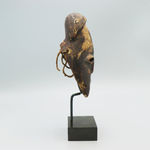Lega Lukwakongo 'Passport' Mask, Nineteenth Century AD
Ivory
17.5 x 8.7 x 7 cm
6 7/8 x 3 3/8 x 2 3/4 in
6 7/8 x 3 3/8 x 2 3/4 in
CC.140
Further images
-
(View a larger image of thumbnail 1
)

-
(View a larger image of thumbnail 2
)

-
(View a larger image of thumbnail 3
)

-
(View a larger image of thumbnail 4
)

-
(View a larger image of thumbnail 5
)

-
(View a larger image of thumbnail 6
)

-
(View a larger image of thumbnail 7
)

-
(View a larger image of thumbnail 8
)

-
(View a larger image of thumbnail 9
)

Among the Lega people of Central Africa there is a secret society known as the bwami. The teaching of bwami initiates stresses the moral code by which all Lega are...
Among the Lega people of Central Africa there is a secret society known as the bwami. The teaching of bwami initiates stresses the moral code by which all Lega are supposed to live, and governs relations between members of the tribe. The bwami society was noted by the use of grades or orders, with the highest being the kindi. During the initiation into different grades of the society, members would wear masks of various kinds, using which they would educate the initiates through dances and songs.
While large masks were designed to be worn over the face, enabling the wearer to inhabit the spirit it embodied, smaller masks, known as lukwakongo or ‘passport’ masks, were worn as body ornaments, either on the arm or in the side of a headdress. They were also used in bwami initiation ceremonies to mark out the ritual space, or as puppets in the ritualised scenes. Lukwakongo were owned by the individual, unlike larger masks which were communally owned, and remained with them until their death. This mask takes the form of an oval face, with triangular nose, open coffee-bean eyes, gaping mouth, and high arching eyebrows. At the top is a protrusion representing the hair of the mask – indeed, many full-sized masks would have had hair made from animal skin, feathers, or fibres.
The use of masks and other objects in the bwami and other similar societies was associated with promoting moral virtues. For example, the ivory figures are imbued with the enormous strength of the elephant from which it came. General concepts of artistry and craftsmanship reflect local sensibilities, but the especially well-made examples, like this one, are associated with individuals, who reflected their status in the objects they used. These objects were well cared for; the wife of the initiate rubbed it with the same oils and camwood paste she used for her own body.
While large masks were designed to be worn over the face, enabling the wearer to inhabit the spirit it embodied, smaller masks, known as lukwakongo or ‘passport’ masks, were worn as body ornaments, either on the arm or in the side of a headdress. They were also used in bwami initiation ceremonies to mark out the ritual space, or as puppets in the ritualised scenes. Lukwakongo were owned by the individual, unlike larger masks which were communally owned, and remained with them until their death. This mask takes the form of an oval face, with triangular nose, open coffee-bean eyes, gaping mouth, and high arching eyebrows. At the top is a protrusion representing the hair of the mask – indeed, many full-sized masks would have had hair made from animal skin, feathers, or fibres.
The use of masks and other objects in the bwami and other similar societies was associated with promoting moral virtues. For example, the ivory figures are imbued with the enormous strength of the elephant from which it came. General concepts of artistry and craftsmanship reflect local sensibilities, but the especially well-made examples, like this one, are associated with individuals, who reflected their status in the objects they used. These objects were well cared for; the wife of the initiate rubbed it with the same oils and camwood paste she used for her own body.








